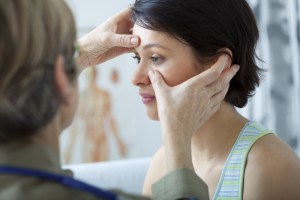108 Glen Osmond Road, Parkside

Sinusitis, when defined in simple terms is an inflammation of the sinus cavities (the hollow spaces in the bone of the cheek and forehead) due to viral or bacterial infections. This usually occurs when one or more of the sinus cavities become inflamed due to blockage of the small tubes (ostium) attached to the nasal passages.
Our sinus cavities are the moist air spaces within the bones of the face around the nose. You usually get Sinusitis after a cold, allergy attack, or irritation from environmental pollutants. Usually mucus that collects in the sinuses drains into the nasal passage, but when you have a cold or an allergy; your sinus cavities become inflamed and are unable to drain. This leads to congestion and an infection of the nasal passages.
Anything that causes swelling in your sinus cavities or keeps the cilia from moving mucus can cause mucus buildup which leads to Sinusitis. This buildup of mucus leads to an increase in sinus pressure and facial pain. When the cilia do not move, all the excess mucus drips down the back of your throat causing Post Nasal Drip.
Types of Sinusitis :
Symptoms :
Typical symptoms of sinusitis include: congestion, thickened post nasal drip, discolored mucus from the nose, facial pain and pressure, headaches, cough, toothache, reduced sense of smell or taste, bad breath and constant throat clearing. You may also develop fatigue, tiredness, poor concentration and rarely hives.
Causes :
Sinusitis in most cases is related to blockage of mucous flow from the sinus cavity into the nose. This blockage may be related to inflammation, allergies, polyps, or congenital abnormalities. Once the sinus openings are obstructed, virus or bacteria present within the mucous lined cavity can begin to multiply and invade tissues resulting in further inflammation and pressure.
Ayurvedic view and Treatment :
In Ayurveda, acute sinusitis can be correlated to peenasa and chronic sinusitis to Dushta Pratishyaya, which is due to the predominance of Kapha and Vata in the region. According to Ayurveda, sinus infections are caused due to an imbalance of prana vata and shleshaka kapha. Prana vata is the sub dosha of vata that control brain and head. Shleshaka kapha controls moisture and lubrication balance. Imbalance of these two doshas blocks the sinus channel. This clogging imbalances pitta and finally leads to sinus inflammation.
Ayurvedic Herbal Treatment :
In Acute Sinusitis (Kaphaja) treatments like Mukhabhyanga, Swedana helps to vilayana of kapha and Nasya with swarasa like gudardraka nasya which does the shirorechana. Avoid sneha nasya in acute stage, it will worsen the condition. Internal medicine should be kapha pachana, lekhana and srotoshodhana.
In Chronic sinusitis kapha will be in ruksha and leena stage, so the aim of treatment should be kapha vilayana by snehana and swedana followed by Nasya with shirovirechana sneha nasya like Shadbindu taila or Anutaila.
Ayurvedic Herbs and Herbal Formulations used are :
Nasya karma, is one of the five detox/ panchakarma therapies mentioned in Ayurveda. It is highly successful in treating sinusitis. It is a process in which medicated oil or powder or fresh juice is administered through the nostrils to clear accumulated kapha.
Yoga Postures recommended in Sinusitis :
Recommended Diet in Sinusitis according to Ayurveda :
Recommended Lifestyle in Sinusitis According to Ayurveda :
In Sinusitis, Ayurvedic Herbal Treatment is very effective. We at Life Line Ayurvedic Herbal Clinic, recommend best Ayurvedic Herbs along with suitable detox therapies and dietary advises after assessing your disease condition. You can contact our expert Ayurvedic doctors to cure your sinusitis and related problems permanently.
Disclaimer : Sandeep Kumar and Anupam Vasudeva are not GP, they have Ayurveda medical degree from India where it is considered equal to any other medical degree. This qualification is recognized in Australia by vetassess governing body as Complementary Health Therapists. Life Line Ayurvedic Herbal Clinic does not claim to cure a disease or terminal illness and does not create any unreasonable expectation of beneficial treatment. Ayurvedic medicines and treatments are generally considered to be safe but rarely may be associated with possible adverse reactions in individual cases. We recommend seeking urgent medical attention in the case of an adverse reaction. This website provides you with information. You must contact your Ayurvedic or another health professional before you apply them. Read More